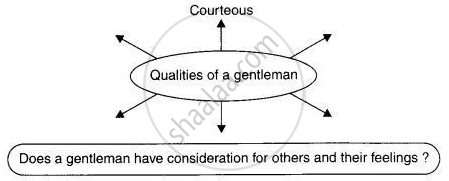Advertisements
Advertisements
प्रश्न
What do you understand by the following statement?
"We do many things, sir," Nicola answered seriously. He glanced at us hopefully.
उत्तर
When the narrator let out his misconceived notion about Nicola and Jacopo that selling and picking of fruits was their only source of income, Nicola tried to correct him. He told him, that they did many things like taking the visitors to the places of interest in Verona like Juliet s Tomb. A hope of getting more business from the writer revived in his heart and his eyes gleamed hopefully. The narrator noticed this fact fully well.
APPEARS IN
संबंधित प्रश्न
What are the qualities of a "gentleman"? Work with your partner and complete
the following web-chart by listing the qualities of a gentleman.

Based on your reading of the story answer the following question by ticking the
correct option.
The driver did not approve of the narrator buying fruit from the two boys because
Based on your reading of the story answer the following question by ticking the
correct option.
Nicola was not pleased when Jacopo asked the narrator to drive them to Poleta as he
Answer the following question briefly.
Why were the narrator and his companion impressed by the two boys?
Discuss the following question and write the answers in your notebook.
Appearances are deceptive. Discuss with reference to the two boys.
Two Gentlemen of Verona is written in the first person. A story written in the first person is a first-hand account of events told or narrated through the eyes of a single character, typically the main character. Stories written in the first person are easily identified by the use of the pronoun 'I' rather than 'he or she'.
The reader will see phrases such as "I said, I thought," rather than "he said, she thought." Everything is experienced through the eyes of a single character, and all thoughts and observations are limited to that one person. There can be no outside observer. If the narrator does not see or experience an event first-hand, it cannot be a part of the story. All scenes in the story are filtered through this person's unique perception.
The third-person is a narrative mode in which both the reader and author observe the situation either through the senses and thoughts of more than one character, or through an overarching godlike perspective that sees and knows everything that happens and everything the characters are thinking. In this mode of narration, the narrator can tell the reader things that the main character does not know, or things that none of the characters know.
Rewrite, in third person, any part of story you like
After her brothers' visit, Lucia writes a page in her diary about her past life and
her present situation. As Lucia, write the diary entry in about 150 words.
Listen to your teacher reading an excerpt from page no. 189, from the diary of a 13
year old girl Zlata Fillipovic who writes of the horrors of war in Sarajevo in her
book Zlata's Diary.
Based on your listening of the passage, complete the following statements.
1. The first sign of approaching war was …………………………………………….
2. The family went into the cellar when ………………………………………………
3. The 'awful cellar' was the only place that could save their lives because …………………
4. Zlata's friend, Nina died when ………………………………………………….......
5. Zlata and her father were worried about her mother's safety because ......................…
Answer the following question:
What will Shakespeare's friend realize when he rises on the Day of Judgment?
Read the given excerpt and answer the questions briefly.
| “Well," I said, "we're leaving on Monday. Is there anything I can do for you before we go?" Nicola shook his head, but suddenly Jacopo said, “Sir," he burst out, "every Sunday we make a visit to the country, to Poleta, 30 kilometres from here. Usually we hire bicycles. But tomorrow, since you are so kind, you might send us in your car." I had already told Luigi he might have the Sunday off. However, I answered, “I'll drive you out myself." There was a pause. Nicola was glaring at his young brother in vexation. "We could not think of troubling you, sir." "It won't be any trouble." |
- Identify the phrase that indicates that the visit to Poleta on Sundays is significant as a routine or tradition. (1)
- What does the narrator's offer to drive the brothers to Poleta reveal about his character? (1)
- Why was there a pause after the narrator’s offer? (1)
- State one reason why Jacopo might have wanted a car ride despite the choice of hired bicycles? (1)
